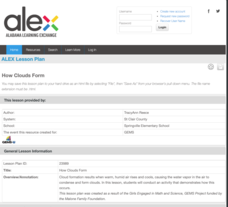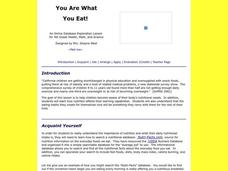Curated OER
Lollies, Lollies, Lollies
Students listen to the problem read to them. They answer some simple questions using number sentences. They then compose a written record of the solution and share their approaches used.
Curated OER
Sharing More Lollies
Students examine the math problem, think about it and discuss with their classmates. They work on the rest of the problems in pairs using problem solving strategies and fractions.
Curated OER
The Fathers' Day Card
Learners subtract using decimals and find half of a decimal number. They write and solve problems which involve decimals and which require a choice of one or more of the four arithmetic operations.
Alabama Learning Exchange
How Clouds Form
Young scholars analyze how clouds form. In this cloud formation lesson, students brainstorm types of clouds and what they think they're made of. Young scholars conduct an experiment to see how clouds form and discuss their observations....
Pennsylvania Department of Education
Use Order of Operations to Evaluate Expressions—No Grouping Symbols
Young scholars identify and explain different types of data collection and graphs. In this graphs and data collection lesson, students record their observations of a variety of data collection tools and graphs displayed in the room....
Curated OER
Rules for Rubrics
How do you create an effective and fair rubric? Read this article to create the best rubric possible.
Curated OER
Big Magic Squares
Students discover that magic squares are interesting objects in both mathematics proper and in recreational mathematics. So they are objects that students should have heard about and experienced.
Curated OER
You Are What You Eat!
Fourth graders discover the nutritional needs of their bodies. Using a database, they research how nutrition affects their learning capabilities. They take the food they eat on a daily basis and discover its nutritional value. They...









